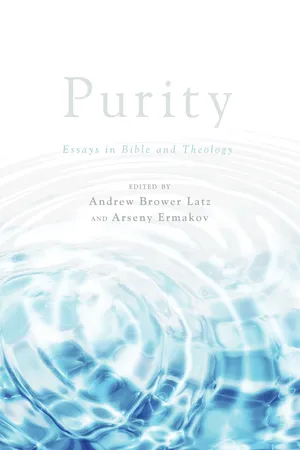![]()
Part I
Purity in Scripture
![]()
1
Purity and Impurity in the Hebrew Bible
Mila Ginsburskaya
Introduction
Any attempt to describe purity/impurity laws and practices in the Hebrew Bible, or even just in the Torah, comprehensively as a system is fraught with methodological difficulties. First of all, as source-critical studies demonstrate, the biblical texts were consolidated and written down over a span of several centuries. As dating, provenance, and criteria for the identification of material stemming from different editors continue to be debated, it is clear that Hebrew Bible writings do not present us with a homogenous exposition of purity and impurity ideas (and indeed any other laws and practices). Secondly, it is impossible to determine whether and how much of these texts reflect the actual practices and how much should be regarded as theoretical treatises promoting the ideological and theological agendas of their compilers. Even Leviticus—the only book within the Torah corpus that appears to give a systematic account of purity and impurity—presents the same problems. Yet if we proceed, bearing in mind that our interpretation is only an interpretation—the map and not the reality—the enterprise of tentatively constructing the model of a phenomenon can give us tools to better grasp the phenomenon, even if the suggested model were to be subsequently dismantled. This chapter constitutes such an attempt, while some of the methodological concerns will be addressed in the course of discussion.
Classification of impurities
When discussing purity and impurity laws in the Torah it is important to note their relativity: the fact that they operate only within a specific system of references—a fact that the text is aware of. Within a different system of references (such as a religious tradition of other peoples) the assignation of the purity and impurity values might be different (see, e.g., Gen 43:32; 46:34; Exod 8:22/8:26 in RSV). In the Torah, the laws of purity and impurity are given to the people of Israel within the framework of their relationship with God. Their function is to help maintain this relationship. It is envisaged that Israelites throughout their life will periodically become impure and they are provided with the rituals of purification to remove the acquired impurity. Impurities incurred by Israelites can be divided into two main categories:
1. Impurity that does not involve breaking God’s commandments (physical impurity);
2. Impurity that involves breaking God’s commandments (sin-impurity).
The most extensive treatment of the purity and impurity laws is found in the legal material of Leviticus and Numbers, upon which I base my presentation below.
Physical Impurity
To this category belong all impurities resulting from human physiological processes as well as those contracted through physical contact. This type of impurity has been traditionally labeled in scholarship as “ritual impurity.” I, however, prefer to call it “physical impurity” since it always has to do something with physical body or touch. Another common characteristic of impurities of this type is that one can purify oneself from them through a designated means of purification. Depending on the complexity of purification rituals, physical impurities can be further sub-divided into major and minor. Purification from both types of impurity involves several steps, such as washing/bathing, shaving, and the period of waiting. However, to purify from a major physical impurity one is also required to bring an expiatory sacrificial offering.
Minor physical impurities include impurities that result from:
• touching an unclean object, animal, or person (e.g., Lev 11:26, 39; 15:5–12; 22:4–7);
• eating some unclean things (e.g., Lev 11:39–40; 17:15);
• normal/healthy genital discharges (seminal emission during intercourse or nocturnal pollution and menstrual blood: Lev 15:16–18, 19–24).
Major physical impurities include:
• impurities generated by diseases resulting in anomalous prolonged genital discharges (zb/zbh, Lev 15:2–15, 25–30) and ṣr‘t or “leprosy” (in persons: Lev 13:1–46; 14:1–32; in cloth, leather, or house: Lev 13:46–59; 14:33–53);
• impurity of a woman after childbirth (Lev 12);
• human corpse-impurity (e.g., Lev 21:1–3, 11; Num 5:1–4 and esp. Num 19), which constitutes a special case: unlike other major impurities it is contracted through touch (or even proximity to the corpse), and the purifyi...
